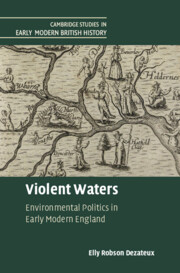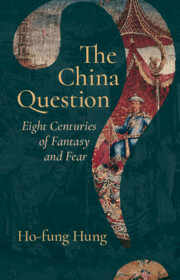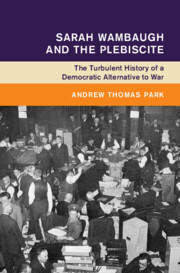Refine search
Actions for selected content:
615759 results in History

Order, Authority, Nation
- Neo-Socialism, Fascism, and Political Conversion in Interwar France
- Coming soon
-
- Expected online publication date:
- February 2026
- Print publication:
- 28 February 2026
-
- Book
- Export citation

Violent Waters
- Environmental Politics in Early Modern England
- Coming soon
-
- Expected online publication date:
- February 2026
- Print publication:
- 28 February 2026
-
- Book
- Export citation

The China Question
- Eight Centuries of Fantasy and Fear
- Coming soon
-
- Expected online publication date:
- February 2026
- Print publication:
- 12 February 2026
-
- Book
- Export citation
Charity After Empire
- British Humanitarianism, Decolonisation and Development
- Coming soon
-
- Expected online publication date:
- February 2026
- Print publication:
- 28 February 2026
-
- Book
- Export citation
Universalism and Regionalism in the Early Islamic World
- The Beginnings of Local History-Writing
- Coming soon
-
- Expected online publication date:
- February 2026
- Print publication:
- 28 February 2026
-
- Book
- Export citation

The Dreaded Pox
- Sex and Disease in Early Modern London
- Coming soon
-
- Expected online publication date:
- February 2026
- Print publication:
- 19 February 2026
-
- Book
- Export citation
Syrian Intellectuals in Exile
- The Dilemmas of Revolution and the Cost of Leaving
- Coming soon
-
- Expected online publication date:
- February 2026
- Print publication:
- 28 February 2026
-
- Book
- Export citation
Broken Cycle
- World Politics in the Age of Dissent
- Coming soon
-
- Expected online publication date:
- February 2026
- Print publication:
- 28 February 2026
-
- Book
- Export citation

Sarah Wambaugh and the Plebiscite
- The Turbulent History of a Democratic Alternative to War
- Coming soon
-
- Expected online publication date:
- February 2026
- Print publication:
- 28 February 2026
-
- Book
- Export citation

Nursing Aids at War
- The Australian Army Medical Women's Service in the Second World War
- Coming soon
-
- Expected online publication date:
- February 2026
- Print publication:
- 28 February 2026
-
- Book
- Export citation

The Hindu/Presidency College
- Excellence and Exclusion
- Coming soon
-
- Expected online publication date:
- February 2026
- Print publication:
- 01 May 2027
-
- Book
- Export citation
The Cambridge Companion to Rammohun Roy
- Coming soon
-
- Expected online publication date:
- February 2026
- Print publication:
- 01 May 2027
-
- Book
- Export citation
Islamic Intellectual History in the Mughal World
- Coming soon
-
- Expected online publication date:
- February 2026
- Print publication:
- 01 May 2027
-
- Book
- Export citation
The New Cambridge History of the English Language
- Africa, Asia, Australasia and the Pacific
- Coming soon
-
- Expected online publication date:
- February 2026
- Print publication:
- 28 February 2026
-
- Book
- Export citation
The Fall of the Tang
- Gao Pian's Trials of Allegiance
- Coming soon
-
- Expected online publication date:
- February 2026
- Print publication:
- 28 February 2026
-
- Book
- Export citation
Unwilling To Know
- Male Homosexuality at the Crossroads of Europe, 1870–1965
- Coming soon
-
- Expected online publication date:
- February 2026
- Print publication:
- 28 February 2026
-
- Book
- Export citation

The Modernist Wish
- A History of Europe, 1914-1939
- Coming soon
-
- Expected online publication date:
- February 2026
- Print publication:
- 28 February 2026
-
- Book
- Export citation
An Unholy Pedagogy
- Visions of Learning from Mesoamerica, 1300-1650
- Coming soon
-
- Expected online publication date:
- February 2026
- Print publication:
- 28 February 2026
-
- Book
- Export citation

Insects and the Enlightenment
- Human-Arthropod Entanglement in the British Eighteenth Century
- Coming soon
-
- Expected online publication date:
- February 2026
- Print publication:
- 28 February 2026
-
- Book
- Export citation

The History of European Union Law
- Constitutional Practice, 1950 to 1993
- Coming soon
-
- Expected online publication date:
- February 2026
- Print publication:
- 28 February 2026
-
- Book
- Export citation
